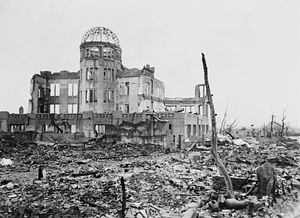U.S. President Barack Obama will visit Hiroshima later this month while in Japan for the G7 meeting, the White House announced today. His visit to the site of the first-ever nuclear bombing will be a first for a sitting U.S. president. Obama’s press secretary said in a statement: “The President will make an historic visit to Hiroshima with Prime Minister Abe to highlight his continued commitment to pursuing peace and security in a world without nuclear weapons.”
In August 1945, the U.S. deployed the only two nuclear weapons to be used in warfare. “Little Boy” was dropped on Hiroshima on August 6 and “Fat Man” on Nagasaki three days later. At the time, Washington argued publicly that the bombings were necessary to force Tokyo’s capitulation. Japan surrendered on August 15, 1945. The two bombings killed more than 200,000 people. Hiroshima today is a memorial park and museum, the eerie dome skeleton of a former exhibition hall looming over the ruins.
In 2009, Obama expressed interest in visiting the sites, saying that “the memories of Hiroshima and Nagasaki are etched in the minds of the world, and I would be honored to have the opportunity to visit those cities at some point during my presidency.” Already in 2016, U.S. Secretary of State John Kerry and U.S. Ambassador to Japan Caroline Kennedy–the daughter of former President John F. Kennedy–visited Hiroshima.
With less than a year remaining in his final term in office, Obama’s trip to Japan this month may be his last as a sitting president.
U.S. presidents have long avoided visiting Hiroshima, fearful that the visit would be translated as an apology. This applies not only in an American context–Obama has long been criticized for going on “apology tours”–but also in Asia, where Japan has long been criticized for neglecting to apologize for its own wartime atrocities.
Last August, Japanese Prime Minister Shinzo Abe delivered remarks on the 70th anniversary of the end of World War II in Asia. Japan’s neighbors–particularly Korea and China–wanted Abe to apologize for Imperial Japan’s sins. The Abe statement pleased some and greatly disappointed others. Obama’s visit is primed to do the same.
The Korea Times carried an editorial opposing the visit last month, writing that it “could also be viewed as a sign of U.S. support for Japanese Prime Minister Shinzo Abe’s historical revisionism.” Another Op-Ed, however, argued in favor of the visit, “because the aim is the bigger cause of protecting humans from the threat of complete annihilation by nuclear weapons.”
In his explanation of the rationale for the visit, Ben Rhodes, a White House adviser, highlighted President Obama’s “personal commitment” to nonproliferation. The crown jewel of that initiative is the Iran Deal, but North Korea is perhaps an even more worrisome potential nuclear power. Pyongyang just finished its first party congress in 36 years on the heels of almost monthly provocations–nuclear and missile tests.
Rhodes wrote that on May 27 Obama will visit Hiroshima and “share his reflections on the significance of the site and the events that occurred there.” Rhodes writes also that Obama “will not revisit the decision to use the atomic bomb at the end of World War II. Instead, he will offer a forward-looking vision focused on our shared future.”
Japan and the United States have a strong relationship today–economically, politically, militarily– something few would have predicted during World War II. The old enemies have become fast friends.
Correction: An earlier version of this story fumbled the names of the two nuclear bombs dropped by the U.S. on Hiroshima and Nagasaki–this error has been corrected.

































